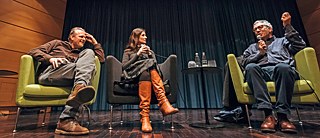Thomas Ostermeier and Didier Eribon
Who is We?

For the production of the play Retour à Reims performed at the Théâtre de la Ville in Paris, Thomas Ostermeier and Didier Eribon meet at the Goethe-Institut for a panel discussion. The director and the sociologist agree: Although the existence of social classes has disappeared from the public consciousness, the topic is more relevant than ever.
By Laura Hosch
The event was booked out days in advance. It’s a mixed audience: lots of Parisian theatre and literature enthusiasts, students and curious people who join the queue just before it begins hoping for vacant seats. Thomas Ostermeier is a well-known name in France. The book Retour à Reims by Didier Eribon became a bestseller in Germany as soon as it was translated in 2016. The theatre adaptation, the “translation” of the sociological text, as Ostermeier calls it, has been playing in French in the Espace Cardin in Paris since mid-January. Tickets for the performances presented by the Théâtre de la Ville are largely sold out. It’s not the first stage adaptation of the book; in 2017 Ostermeier’s productions met with great interest in Manchester and at the Schaubühne Berlin. Now Returning to Reims returns to France. Thomas Ostermeier and Didier Eribon meet for a panel discussion at the Goethe-Institut Paris, moderated by sociologist and dance critic Laura Cappelle. Ostermeier and Eribon have known each other for a long time. While visiting Paris shortly after the election of Donald Trump as US President, Ostermeier proposed a joint project for the first time. “We had lunch together, and Thomas said he urgently needed to do something with my book. He just didn’t know what and when,” remembers Eribon.

Confronting his own past
In his book, a mixture of personal confession and sociological analysis, Eribon reports on his reunion with his hometown and his family, which he’d hardly seen for decades – didn’t want to see – since beginning his career as a professor in Paris. By confronting his own past, he becomes aware of certain blind spots in descriptions of current social developments. He mentions the exclusion mechanisms of the same bourgeoisie that he himself now belongs to, and the fact that many in the formerly communist working class have voted for the right-wing populists of the Front National in protest more than once in recent years. How could this have happened? What part do the left play in it, what part he, as an intellectual denying his origins?
What’s happening in Europe right now?
Thomas Ostermeier notes that he read the book while on holiday and initially didn’t even think about using it for the theatre. However, he realised, “You’re not alone.” Due to the political mood in Germany and the fact that more and more people are living below the poverty line and hardly anything has been written about the existing social injustice, he then saw the need to respond to the current situation. But how does one deal with the class system on the stage if the category of class is often considered obsolete? “It used to be: We, the workers,” Eribon describes the situation. “Today the same people say: We, the French.” However, these very same French are workers more than ever. A similar situation is also apparent for many people living under precarious circumstances in Germany. The protest in Germany is usually quiet and anonymous, but manifests itself in the rise of the AfD. Ironically, the German version of Returning to Reims premieres at the Schaubühne on the same day that the populist right-wing party moves into parliament as the third strongest force in the 2017 Bundestag election. Many spectators come to the theatre that evening with mixed feelings. What’s happening in Europe right now?